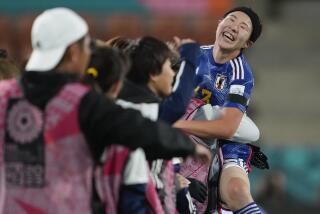These Brazilians Are Still in It
- Share via
BOCHUM, Germany — Brazil has gone home, but there are still two Brazilians who could win the World Cup.
One is Luiz Felipe Scolari -- he of the clipped mustache, he of the arm-waving antics on the sideline, he who berates officials and inspires players, he who must be obeyed.
Known as “Big Phil” or “General Felipao,” Scolari is the no-nonsense coach of Portugal, which plays France today in Munich in the semifinals of the 2006 tournament, with the winner to play Italy on Sunday for the championship.
Scolari is the same man who coached Brazil to its 2002 World Cup triumph in South Korea and Japan, and he comes into today’s game with a record unbeaten streak of 12 World Cup games -- seven in 2002 and five in 2006.
He could become the first coach to win the World Cup with two countries.
The French know very well not to take Scolari lightly. Tactically, the 57-year-old from Passo Fundo in the southern Brazilian state of Rio Grande do Sul is on a par with Dutchman Guus Hiddink, who coached Australia’s Cup team.
Scolari and Hiddink also are widely acknowledged to be the best motivators in the game on the international level.
The other Brazilian -- or now perhaps only half Brazilian -- still within reach of the trophy is Anderson Luiz de Souza, better known simply as Deco, Portugal’s small but live-wire playmaker.
It was in the winter of 2002, or possibly the spring of 2003, that Scolari and Deco first crossed paths. Scolari had resigned as coach of Brazil and accepted the challenge of coaching Portugal, which was to stage the European Championship in 2004.
Deco had already spent several years in Portugal, having left his home in Sao Bernardo do Campo, near Sao Paulo, at age 15 to pursue a soccer career, and then left Brazil altogether at 18 to further that dream in Europe.
After a couple of seasons with lesser clubs, Deco caught the eye of FC Porto, and there, under the tutelage of then-coach Jose Mourinho, Deco’s game blossomed. Always blessed with superior technical skills and an outstanding first touch, Deco also possessed tremendous vision, the ability to read the game on the fly and react accordingly. He controlled the pace of games, his passes cut opponents to shreds and his finishing helped Porto thrive.
With Deco in the lineup, the club won Portuguese league titles in 2003 and 2004, and added two bits of European silverware to its trophy cabinet -- the UEFA Cup in 2003 and the European Champions League title in 2004.
Not surprisingly, fans, especially in the northern city of Porto, clamored for “O Magico,” as they called him, to be included on the national team. He had lived in Portugal for five years and was eligible for citizenship if he chose to accept dual nationality.
It was a difficult choice, but Scolari helped him make it.
“Although sooner or later I knew I would have got the chance with Brazil, I felt as though I should give something back to Portugal, which had helped form me as a footballer,” Deco said this year. “It was very complicated because your heart belongs to the country where you were born.”
As luck would have it, Deco’s debut for Portugal, in 2003, was against the land of his birth. He came on as a late substitute and scored the winning goal on a trademark free kick that gave Portugal its first victory over Brazil in 37 years.
With that sort of performance, even critics, such as Portugal teammates Luis Figo and Rui Costa, who had not approved of having naturalized players on the national team, were silenced. Before long, he was an integral part of the Portuguese team and sportswriters began talking about “the art of Deco.”
In July 2004, after Mourinho had left Porto to take charge of Chelsea in England, Deco also made his move, joining FC Barcelona in a deal that netted the Portuguese club $27 million.
Deco helped Barcelona win the Spanish title in 2005, and this spring the club not only defended that title but also won the European Champions League. His contract was then extended through 2010. Barcelona’s Dutch coach, former World Cup star Frank Rijkaard, regards Deco as indispensable.
“Deco is the barometer of our season,” Rijkaard said. “When he is in form, the quality of the game rises. When he is not so good, the team as a whole performs less well.”
Scolari feels the same way, which is why Deco was an automatic choice for the Portugal team that reached the final of Euro 2004, where it lost to Greece, and for the 2006 World Cup.
Deco, in turn, said Scolari in private is not the martinet he appears to be in public.
“He is very relaxed and has a lot of fun with players, different to how he is perceived in the press,” Deco said. “We could not be better prepared either.”
Still, Scolari tries to protect the tough-guy image. After he had steered Portugal to the second round for the first time in 40 years, there were tears, but Scolari denied them.
“I’m not sure whether I was crying, but I was very happy and I showed my emotions,” he said. “Maybe my eye color changed, but that’s it.”
He has mellowed somewhat since his club days, when he used tactics that were less than sporting -- telling his players to commit fouls, instructing ball boys to delay giving the ball back to opposing teams, and so on.
Before ousting England on penalty kicks in the quarterfinals, Scolari showed that the blunt side is still there.
“I am not a trainer who lies and says that I want to win beautifully,” he said. “I want results. Some of those who have played beautifully are already at home.”
That approach has led to a 19-game unbeaten streak for Portugal, and Scolari has won a record 31 of his 49 games in charge of the national team, adding what he calls “a warrior mentality” to the players’ natural skills.
The Portuguese swear by him.
“He has brought self-esteem and made the players believe in themselves,” midfielder Simao Sabrosa said.
Said Deco: “He is a strong character and a friend of the players. The secret of his success is the atmosphere he creates in the squad. We are very happy with him.”
All of Portugal will feel that way tonight if Scolari can somehow inspire his team to defeat France and reach the final in Berlin.
*
(BEGIN TEXT OF INFOBOX)
Solid work
A look at the coaching resume of Luiz Felipe Scolari and the career highlights for Deco:
SCOLARI
* 1991 -- Copa Brazil with Criciuma.
* 1994 -- Copa Brazil with Gremio.
* 1995 -- Copa Libertadores with Gremio.
* 1996 -- Brazilian championship with Gremio.
* 1998 -- Copa Mercosur with Palmeiras.
* 1999 -- Copa Libertadores with Palmeiras.
* 2002 -- World Cup with Brazil.
* 2004 -- Runner-up in Euro 2004 with Portugal, losing the final to Greece.
*
DECO
* 2003 -- Portuguese title; UEFA Cup with FC Porto.
* 2004 -- Portuguese title and European Champions League with FC Porto. Runner-up in Euro 2004 with Portugal, losing to Greece.
* 2005 -- Spanish title with FC Barcelona.
* 2006 -- Spanish title and European Champions League with FC Barcelona.
GRAHAME L. JONES Los Angeles Times
More to Read
Go beyond the scoreboard
Get the latest on L.A.'s teams in the daily Sports Report newsletter.
You may occasionally receive promotional content from the Los Angeles Times.






